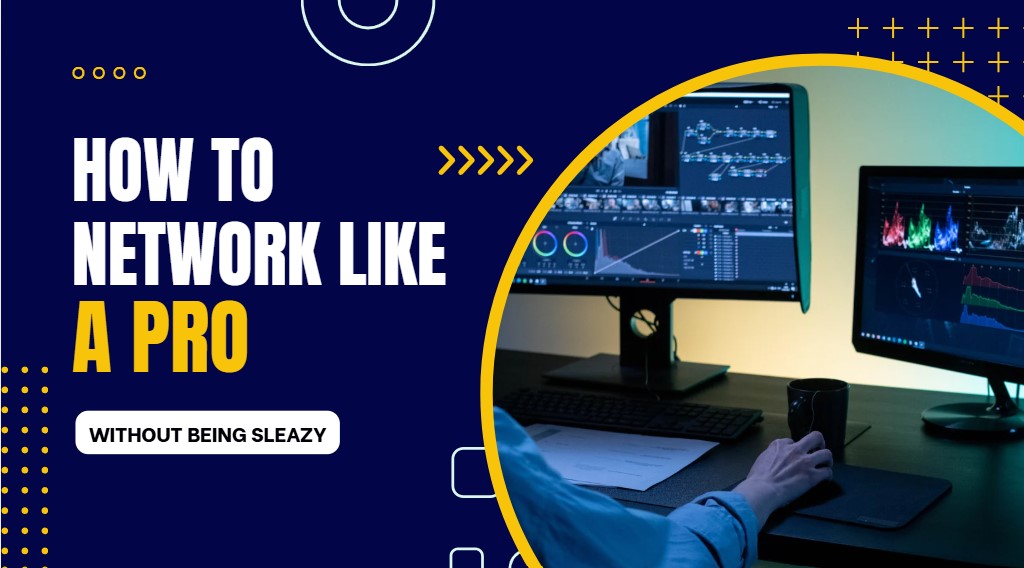Most “networking advice” is either painfully obvious (“Be nice!”) or straight-up manipulative (“Use these scripts to extract favors!”). Real networking—the kind that actually opens doors—isn’t about schmoozing at happy hours or spamming LinkedIn connections. It’s about building real relationships that benefit both sides.
Here’s how to do it right.
Networking Isn’t a Transaction—It’s a Superpower
Think of the last time you got a great job lead, a killer referral, or insider industry advice. Chances are, it didn’t come from a cold DM—it came from someone who already knew and trusted you.
That’s the secret: Networking isn’t about collecting business cards; it’s about planting seeds you can harvest later.
Start With Who You Already Know
Before you start cold-messaging strangers, audit your existing circle:
- That former coworker who moved to a dream company
- Your cousin’s friend who works in your target industry
- The client who always laughs at your jokes in meetings
Reach out with a human message:
- “Hey Sam, saw your post about the new project—looks awesome. How’s the new role treating you?”
- “Been meaning to reconnect! Coffee on me next week?”
Pro move: Offer something first—an article they’d like, an intro to someone in your network, or just genuine praise.
Where to Find Your People
If your network feels stale, go where your ideal connections hang out:
- Industry conferences (But skip the generic “What do you do?”—ask better questions like “What’s one thing you wish more people understood about your work?”)
- Niche online communities (Think private Slack groups, Substack comment sections, or even Reddit threads where pros actually geek out.)
- Volunteer gigs (Nothing bonds people faster than painting a school wall together at 8 AM on a Saturday.)
Example: A graphic designer landed her biggest client by chatting in a freelancer meme group on Facebook. Why? Because shared humor builds rapport faster than a stiff LinkedIn post.
The Follow-Up That Actually Works
90% of networking fails here. Instead of:
- “Great meeting you! Let’s stay in touch.”
Try:
- “Loved your take on [specific thing they said]. I just shared this [article/tool] with a colleague who’s dealing with the same issue—thought you’d find it useful too.”
- “You mentioned you’re into [hobby]. My friend runs a [related event]—want me to intro you?”
Golden rule: Give before you ask. Even if it’s just sending a meme they’d appreciate.
Digital Networking Without the Cringe
Your online presence is your 24/7 networking event. Fix these first:
- LinkedIn: Ditch the corporate buzzwords. Write your profile like you’re explaining your job to a friend at a BBQ.
- Twitter/X: Follow thinkers in your field, then add smart commentary to their threads. (No “Great post!”—add actual insights.)
- Newsletters: Comment on posts from indie writers. They always notice and often reply.
Case study: A startup founder landed a TechCrunch feature because a journalist remembered his witty replies to her tweets.
The Unwritten Rules
- Never lead with a favor. Build social capital first.
- Remember details. Use a CRM (or a Notes app) to track kids’ names, hobbies, or allergies. (“How’d your daughter’s soccer finals go?” > “Let’s synergize!”)
- Introduce people liberally. Become a connector, and you’ll become unforgettable.
When It’s Time to Ask
Need a job referral? Client intro? Here’s the non-awkward script:
- *”I’m exploring roles at [Company]. I noticed you worked there—would you be open to a 15-minute chat about your experience?”*
- “I’m helping [Client] with [Project] and thought you’d be perfect for [Specific Need]. Can I buy you coffee to brainstorm?”
Key: Make it easy, specific, and mutually beneficial.
The Long Game
The best networkers play for decades, not quarters. Example:
- A journalist kept in touch with a source for 8 years before finally collaborating on a best-selling book.
- A software engineer randomly helped a stranger debug code in a forum. That stranger later hired him at Google.
Bottom line: Stop “networking.” Start being genuinely interested in people, and opportunities will follow.
“But I’m introverted!”
- Text > calls.
- Small gatherings > giant conferences.
- Deep convos with 3 people > small talk with 30.
Your network isn’t your net worth—it’s your safety net, idea generator, and career accelerator. Treat it that way.
